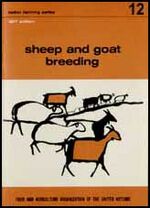How to look after sheep and goats[edit | edit source]
Vaccinate animals before they are ill.
Vaccination protects a child from disease; you do not wait for the child to be ill.
In the same way, vaccination protects an animal from disease; do not wait for the animal to be ill.
Vaccination tires animals a little, but it is not dangerous if they are well fed and well housed.
There will be fewer diseases if the animals are well fed and kept really clean.
Parasites are the worst problem in sheep and goat breeding.
Protect animals from parasites. Give them clean water to drink. Do not leave the flock near streams. Do not keep more than 20 animals together. Parasites and contagious diseases multiply in big flocks.
A diseased animal gives the disease to all the flock.
Take special care with the young ones and mothers; they are the most delicate.
Parasites[edit | edit source]
Skin parasites
- Mange or scab
The animal scratches, its hair comes out, scabs form.
Wash the animals with warm water and soap.
Soak a piece of cloth in mineral oil and rub the animal.
Repeat every day.
- Ticks
They stick to the animal's skin and suck the blood.
Wash the animal with water and a pesticide such as toxophene.
Rub the animals regularly every week
Parasites in the body
Usually they live in the digestive system, in the lungs or in the nerves.
The parasite eggs are left by flies in the pasture.
These eggs develop in the grass and are eaten with the grass by the animals. Then they develop in the animal's body.
Parasites living in the lungs, such as lung worms, are controlled by the use of aerosols or with phenothiazine.
Parasites living in the digestive system, such as strongyles, are controlled with phenothiazine before the animal is ill.
Ask the animal husbandry service for advice on treating liver rot (liver fluke infestation), coccidiosis and tapeworm.
Parasites living in the brain cause gid (or sturdy). Animals walk like drunk persons. They must be slaughtered before they die.
When parasites have got into a pasture, do not take animals there for a long time. The parasite eggs hatch out, but as there are no animals, the parasites cannot attack them and have nothing to eat. So they die.
The animals should not feed in wet pastures because that is where parasites live.
Infectious diseases[edit | edit source]
Enterotoxaemia
This is a serious disease of lambs.
They should be vaccinated to protect them against it.
Anthrax
This disease infects all animals and man.
Vaccination beforehand is needed, otherwise all the animals die.
Animals that die of this disease must be burned. The blood of the dead animal is black.
People must not eat the meat of animals with anthrax because they can catch the disease and die.
The animal husbandry service must be informed.
Foot- rot
The horny parts of the foot are destroyed and the animals limp.
The animals can be cured in the following way: dig a little ditch at the door of the shed, and fill the ditch with water and an antiseptic such as formally in the correct proportion. Then make the animals walk through the water. Their feet will heal up.
Foot- and- mouth disease and sheep- pox
The animals will not catch these two diseases if they are vaccinated beforehand.
Do not put the animals in marshy pastures or in dirty sheds. The sheds must be cleaned out. This is where diseases and parasites live.
